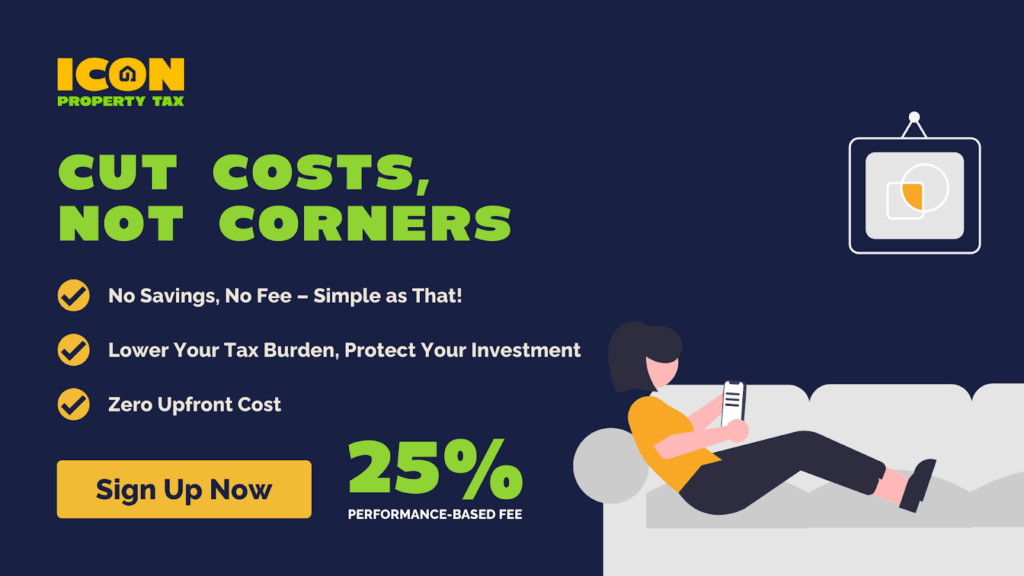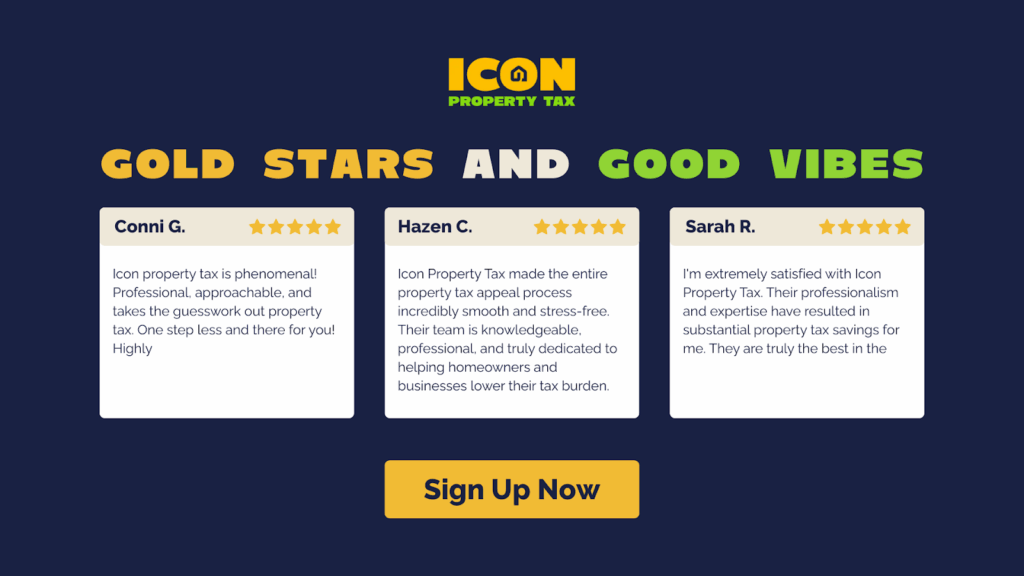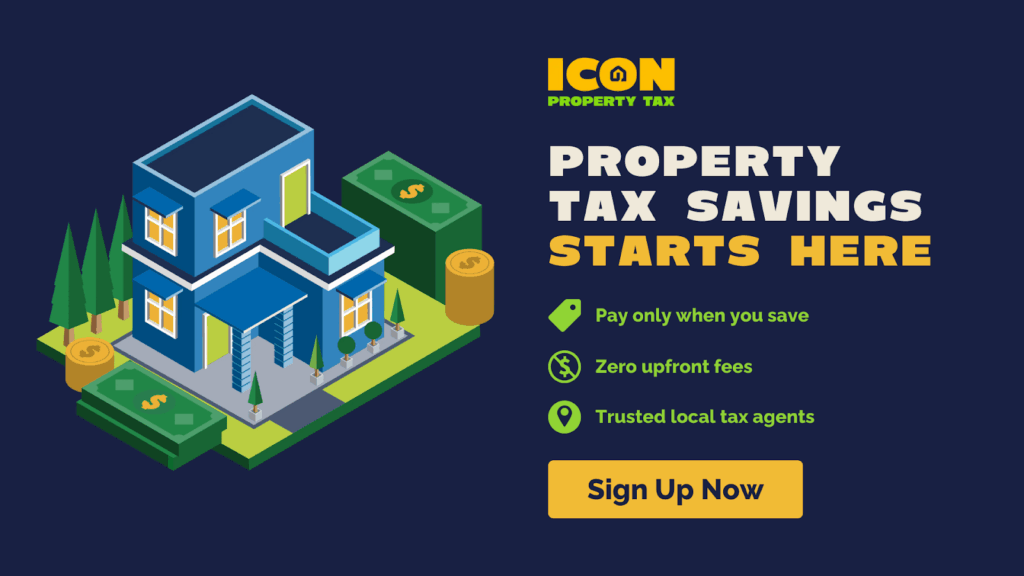Smart Home Buying Strategies To Help You Save Big
August 25, 2025
Key Takeaways:
- Full-Cost Budgeting: Learn how to prepare for the true cost of homeownership, including tax shifts, utility expenses, and features that increase assessed value.
- Targeted Buyer Support: Uncover mortgage and assistance options tailored to first-time buyers, veterans, and public servants in Texas.
- Long-Term Savings Strategy: Get strategic guidance on exemptions and mortgage types that help lower your long-term financial burden.
At Icon Property Tax, we’ve saved property owners over $100 million by challenging inflated assessments and securing fair valuations. With over 30 years of combined industry experience, our team of local tax experts uses advanced data analytics and personalized strategies to maximize your savings. Our performance-based model means you pay nothing upfront and only when we successfully reduce your property taxes.
Buying a home is one of the most significant financial decisions you’ll make, and understanding the full scope of ownership costs is crucial. Beyond the purchase price, factors like property taxes, insurance, and maintenance can impact your long-term financial health. By implementing smart home buying strategies, you can make informed decisions that align with your budget and future goals.
In this article, we will discuss key strategies to help you navigate the home buying process effectively and save money in the long run.
Build A Budget That Reflects True Ownership Costs
Buying a home isn’t just about securing a mortgage—it’s about planning for the full financial picture. One of the most common missteps new homeowners make is focusing solely on the loan and overlooking the many recurring expenses tied to ownership. A smart home buying strategy starts with a realistic, all-encompassing budget that accounts for both expected and hidden costs.
Review The Assessed Value And Tax History
Property taxes can rise after closing, especially if the home hasn’t been sold in years. When the county updates the assessed value to reflect the sale price, the annual tax bill often increases. Reviewing the home’s past tax history can help you estimate your post-purchase obligations and avoid unpleasant surprises.
Study Comparable Sales In The Area
Looking at recent sales of nearby homes with similar size and features gives you a benchmark for both value and taxes. A home with upgrades—like a new kitchen or swimming pool—might look like a steal upfront, but could come with a higher tax basis that stretches your budget.
At Icon, we believe in results—not fees. That’s why you pay nothing unless we successfully reduce your property taxes. Get started risk-free with our No-Savings, No-Fee Pledge.
Factor In Features That Affect Costs
Amenities such as detached garages, custom additions, or energy-efficient installations may raise the market value—and by extension, the property taxes. Be sure to calculate how these features impact your overall expenses in the long run.
Explore Exemption Eligibility
Programs like the homestead exemption or over-65 discounts can significantly reduce your taxable value. If you meet the eligibility requirements and file the necessary paperwork after closing, these exemptions can lower your property tax bill year after year.
Account For All Housing Expenses
Beyond your mortgage, make sure to include line items like homeowners insurance, utilities, HOA dues, and repair costs in your monthly budget. These recurring expenses may seem minor individually but can add up quickly, especially in the first year of ownership.

Boost Your Credit Score For Better Mortgage Rates
Your credit score is one of the most powerful tools you have when buying a home. It doesn’t just determine whether you qualify for a mortgage—it directly affects the interest rate you’re offered, which can either cost or save you thousands over the life of your loan. A better score means better terms, and even small improvements can translate into big financial wins.
Start By Reviewing Your Credit Reports
Before applying for a mortgage, pull your credit reports from the three major bureaus: Equifax, Experian, and TransUnion. Look for errors like incorrect balances, outdated accounts, or unfamiliar activity. Disputing these inaccuracies can give your score a quick boost and help ensure lenders view your financial profile accurately.
Lower Your Credit Utilization
Lenders pay close attention to how much credit you’re using relative to your limits. Known as your credit utilization ratio, this figure should ideally stay below 30%. Paying down credit card balances—even by a few hundred dollars—can make a noticeable difference in your score and help you qualify for better loan terms.
Avoid New Credit Applications Before Closing
Each hard inquiry (like a new credit card or auto loan application) can shave points off your score and raise red flags for mortgage lenders. If you’re rate shopping for mortgages or auto loans, try to do so within a 30-day window to minimize the impact on your score. Hold off on opening new lines of credit until after you’ve closed on your home.
Don’t Close Old Accounts Prematurely
While it may be tempting to simplify your finances, closing long-standing accounts can actually hurt your score by lowering your average account age. Keep older accounts open and in good standing until after your mortgage is finalized.
First-Time Home Buyer Programs That Can Lighten The Load In Texas
Buying your first home can feel like navigating a maze of costs, paperwork, and unfamiliar decisions. Fortunately, if you’re purchasing in Texas, there are several state-backed and specialized programs designed to ease the financial pressure. These programs are crafted to help first-time buyers manage both upfront expenses and long-term affordability—making homeownership more accessible than many realize.
Access Down Payment Assistance And Reduced-Interest Loans
First-time buyers in Texas can take advantage of programs that offer down payment assistance or reduced-interest loans, helping to ease the upfront cost of homeownership. Some programs provide grants that don’t require repayment, while others offer favorable loan terms that stretch your budget further.
Specialized Support For Public Servants And Veterans
Teachers, first responders, veterans, and other public service professionals may qualify for special programs that reduce loan requirements, offer deferred payments, or provide partial loan forgiveness. These benefits can often be combined with other forms of assistance to maximize affordability.

Consider The HANC Program For New Construction
The Homebuyer Assistance with New Construction (HANC) program supports buyers interested in new builds or manufactured homes. With loan terms ranging from 15 to 30 years and interest rates potentially as low as 0%, it offers an affordable path to customizing your home from the ground up.
Stay Organized With Documentation
Applying for these programs often requires documentation like tax returns, income verification, and proof of eligibility. Preparing these materials in advance helps streamline the approval process and prevents delays that could impact your purchase timeline.
Don’t let inflated tax assessments chip away at your home’s value. Our experienced team at Icon uses cutting-edge tools and local expertise to help lower your tax burden and keep more money in your pocket.
Use Property Tax Exemptions To Reduce Your Annual Bill
Many new homeowners in Texas overlook valuable property tax exemptions that could significantly reduce their yearly expenses. Filing for the right exemption shortly after closing—such as the homestead exemption, over-65 exemption, or veteran-related relief—can lower your home’s taxable value and result in long-term savings.
These exemptions aren’t applied automatically, so it’s important to review your local appraisal district’s requirements and file the necessary paperwork promptly. By understanding what you qualify for and acting early, you can avoid overpaying and better manage the cost of homeownership year after year.
Compare Mortgage Types Based On Your Budget And Timeline
With so many mortgage options available, it’s important to choose one that aligns with your financial goals and how long you plan to stay in the home. Each loan type offers different advantages and potential trade-offs—here’s how they stack up:
Fixed-Rate Mortgages: Predictability Over Time
Fixed-rate mortgages lock in your interest rate for the entire loan term, keeping your monthly payments stable. This is ideal for buyers who plan to stay in their home long-term and want protection against rising interest rates.
Adjustable-Rate Mortgages (ARMs): Lower Initial Rates
ARMs offer lower introductory rates that adjust periodically after a set term. They can be a smart choice if you expect your income to grow or plan to sell or refinance before the rate adjusts.
Government-Backed Loans: FHA, VA, And USDA Options
FHA loans help buyers with lower credit scores or smaller down payments, while VA loans offer favorable terms to eligible veterans with no down payment. USDA loans support rural homebuyers with zero-down options based on income and location.
Jumbo Loans: Financing For High-Value Homes
Jumbo loans are designed for properties that exceed conventional loan limits and require strong credit and larger down payments. These loans are common for luxury homes and high-demand markets, offering higher borrowing power with stricter terms.

Final Thoughts
Smart home buying isn’t just about finding the right property—it’s about making informed decisions that support your financial stability for years to come. From improving your credit score to choosing the right mortgage and leveraging available programs and exemptions, each step offers a chance to reduce your long-term costs.
By taking the time to plan, research, and prepare, you’ll not only feel more confident during the buying process but also set yourself up for success as a homeowner. A strategic approach today can lead to meaningful savings tomorrow.
Frequently Asked Questions About Smart Home Buying Strategies
What are some hidden costs that home buyers often overlook?
Home buyers often focus on the purchase price and mortgage but forget to factor in items like moving expenses, utility setup fees, pest inspections, and post-purchase furnishing or upgrades. These smaller costs can add up quickly, especially in the first few months after closing.
How can I prepare financially a year before buying a home?
Start by building a dedicated savings fund, tracking your monthly expenses, and reducing debt. It’s also wise to get prequalified by a lender early on to understand your potential borrowing range and avoid surprises later.
Should I rent while searching for the right home or wait until I’m ready to buy?
If you’re unsure about your long-term plans or haven’t saved enough for upfront costs, renting can provide the flexibility to wait for the right opportunity. However, if you’re financially stable and the market favors buyers, purchasing sooner may lock in better terms.
What’s the difference between pre-qualification and pre-approval?
Pre-qualification is an estimate based on self-reported financial information, while pre-approval involves submitting official documents and undergoing a credit check. Sellers often take pre-approval more seriously when reviewing offers.
Can I buy a home if I have student loan debt?
Yes, many buyers with student loans successfully purchase homes. Lenders typically look at your debt-to-income ratio, so consistent payments and a manageable loan balance can keep you eligible for financing.
How do I know if a neighborhood is right for me?
Visit at different times of day, talk to residents, check crime stats, and evaluate amenities like schools, public transit, or local shops. Online community forums can also offer insight into neighborhood culture and development trends.
What is an escrow account, and do I need one?
An escrow account is set up by your lender to collect monthly payments for property taxes and insurance. It simplifies budgeting and ensures these bills are paid on time, though some buyers prefer to manage them independently if allowed.
How do I make a competitive offer without overpaying?
Work with a real estate agent to assess comparable sales and understand the local market. You can also add contingencies, such as appraisal or inspection clauses, to protect yourself while still standing out to sellers.
Is it possible to negotiate closing costs?
Yes, buyers can negotiate with sellers to cover part of the closing costs or seek lender credits. Sometimes builders or first-time buyer programs also offer closing cost assistance, especially in competitive markets.
How long does the home buying process typically take?
From pre-approval to closing, the home buying process typically takes 30 to 60 days. The timeline can vary based on market conditions, financing approval, inspections, and negotiations.

